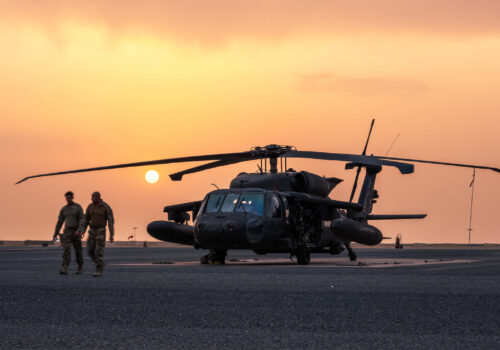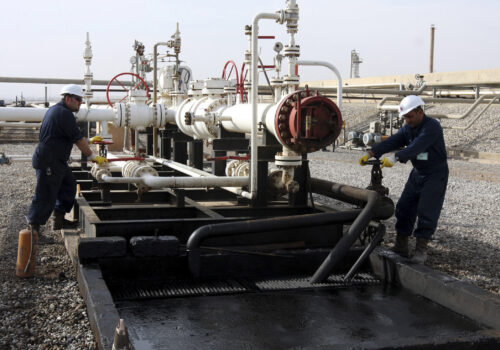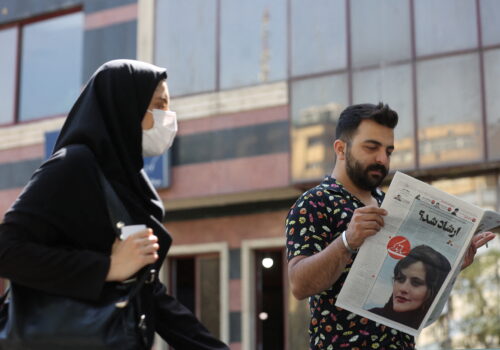Why Washington’s anti-PMF moves are testing the Iraq partnership
Recent measures from the Trump administration against Iraq’s Popular Mobilization Forces (PMF)—a 240,000-strong force with an annual budget of roughly $3.5 billion—portend a more difficult US–Iraq relationship, with growing implications across the security, political, and economic realms.
In an October phone call, US Secretary of State Marco Rubio emphasized to Iraqi Prime Minister Mohammed Shia al-Sudani the “urgency of disarming Iran-backed militias that undermine Iraq’s sovereignty.” The use of the terms “militias” and “disarming” was notable and revealing, as Rubio appeared to be referring to groups within the PMF. It was the first time a senior US official explicitly used the word “disarm” to describe Washington’s stance on the fate of these groups. Indicative that the request was not well received on the Iraqi side, the readout of the call released by al-Sudani’s office made no mention of the armed factions. It also appeared to contain a veiled criticism of “unilateral” US measures affecting Iraq, calling instead for prior “communication and consultation”—likely alluding to recent US actions targeting PMF groups.
Washington has now clearly communicated its demand that PMF groups disarm. Yet key questions remain: what does “disarming” actually mean, how and when would it be implemented, which groups within the PMF would it target, and by whom? The US government appears intent on leveraging the post–October 7 regional environment to intensify pressure on the Iran-led axis, including in Iraq. The real test of this strategy will come during post-election government formation, when it becomes clear how serious Washington is, whom it classifies as “Iran-backed militias,” and what role it is willing to allow them to have in Iraq’s next civilian and military structures.
Increasing US action, and a sharpened PMF commission law
Recent US actions against the PMF include the State Department in September designating four Shia armed factions—Harakat al-Nujaba, Kata’ib Sayyid al-Shuhada, Harakat Ansar Allah al-Awfiya, and Kata’ib al-Imam Ali—as Foreign Terrorist Organizations. In its announcement, the department cited the groups’ links to Iran and their attacks across Iraq—including against the US embassy in Baghdad and bases hosting US and coalition forces—as grounds for the designations. It also framed the move as implementing Trump’s recent national security presidential memorandum, issued in February, to impose “maximum pressure” on Tehran and its aligned groups.
Additionally, on October 9, the US Treasury Department imposed sanctions on the Muhandis General Company—a conglomerate operating under the PMF—and on financial networks affiliated with Iran’s Islamic Revolutionary Guard Corps for “divert[ing] funds from Iraqi government contracts” to the PMF and facilitating “money laundering for Iran.” The Iraqi government reacted by calling the US move “extremely unfortunate and incompatible” with the “spirit of friendship and mutual respect” that characterized the two countries’ bilateral ties.
An intense diplomatic campaign by Washington to dissuade the Iraqi government and Shia leaders from passing a new PMF commission law preceded these US designations, including a warning from Rubio that passing the legislation “would institutionalize Iranian influence and armed terrorist groups undermining Iraq’s sovereignty.” Critics of the detailed amendment bill are concerned that the legislation goes further than a previous, more brief 2016 PMF commission law. Critics also say the bill cements Iran’s influence in Iraq, gives the force a new and permanent institutionalized status, increases the PMF’s independence, implicitly allows it to intervene in politics on the grounds of “protect[ing] Iraq’s constitutional and democratic system,” and expands PMF activity to the economy and culture. This would replicate the model of Iran’s Islamic Revolutionary Guard Corps, known for its broad tentacles across Iranian life, including government.
The bill was initially proposed by Iraq’s cabinet and sent to the parliament in March. This combined two earlier bills that were drafted partly due to internal power struggles over the PMF’s leadership and partly as an attempt to use the final months of the current parliament, in which Shia groups hold a majority, to push the law through. However, amid intense US pressure, the Iraqi Parliament and major Shia groups did not move forward with a vote on the law after repeated attempts in July and August failed to reach a legal quorum. Kurdish and Sunni groups opposed the passing of the law.
Both moves point to Washington’s strong interest—largely an extension of its Iran policy—to contain the reach and influence of pro-Iran armed factions. Although not all PMF groups are aligned with Iranian policy, it is dominated by pro-Iran factions and figures such as the Badr Organization, Kata’ib Hezbollah (KH), and Asa’ib Ahl al-Haq (AAH). Given the PMF’s incorporation into the state as a key pillar of Iraq’s security-military apparatus and, increasingly, into politics via its party offshoots, a confrontational US posture could further complicate Washington’s relations with Iraq.
Amid Washington’s growing opposition, expanding the depth and breadth of PMF’s role in Iraq’s military-security complex—as the PMF bill would facilitate—could further strain US-Iraq security cooperation. This could prompt tighter curbs on intelligence sharing, complications for US training and advisory engagements, limits on operational support to counterterrorism missions involving mixed formations that include PMF units, and stricter end-use monitoring of US-provided weaponry and equipment. In 2017, PMF units were found to possess US Abrams tanks and used them in operations against the Kurdish Peshmerga forces, prompting controversy in Congress. It could also reduce Washington’s willingness to intervene to shield Iraq from potential strikes on PMF forces by outside actors such as Israel. The United States has been credited with helping keep Iraq out of the region’s post–October 7 turmoil despite PMF groups’ attacks on Israel, primarily to keep its troops out of the line of fire from pro-Iran factions.
SIGN UP FOR THIS WEEK IN THE MIDEAST NEWSLETTER
Impacts on Iraq and the US partnership
The US campaign against the PMF groups will likely have significant implications for Iraq’s political process moving forward. PMF-aligned parties have played a prominent role since 2022, becoming key partners in the coalition that formed the government after the Sadrist Movement withdrew from parliament. The movement, led by Shia cleric Muqtada al-Sadr, had won the most seats in the 2021 elections but boycotted the political process after failing to form a government. Key PMF groups such as Badr, AAH, and KH hold important roles in the federal government and provincial administrations. The continued Sadrist boycott paves the way for PMF groups to retain a prominent hand in forming the next government and to potentially push through the new PMF law in the next parliament.
This could further complicate Iraq’s political process and post-November government formation, as Washington will likely seek to use the current momentum against the Iran-led regional front to oppose a prominent role for, or even possibly the inclusion of, pro-Iran PMF groups in the future government as part of its broader effort to counter Iranian influence. Given the deep fragmentation of Iraqi politics, US opposition to these actors could make the process even more protracted. One possible outcome might be for Washington to support a prime minister not tied to the PMF groups, while not opposing some role for those groups in other capacities within the government. Iraq’s ethnic-sectarian system of governance and partisan bargaining notoriously draw out the government formation process after elections. For instance, after the 2021 elections, it took parties a year to form a cabinet. In the Kurdistan Region, there is still no new government despite parliamentary elections held last October.
Given the PMF’s expanding footprint in Iraq’s economy, US measures against PMF and Iran-linked actors could also weigh on Iraq’s economic sector. Washington has sanctioned entities and individuals tied to PMF networks for activities Washington deems illicit—from entities involved with banking to oil smuggling, and airlines—creating compliance risks for Iraqi ministries, state firms, and private contractors. The Muhandis General Company conglomerate of PMF-affiliated companies has assumed a growing role across construction, logistics, and public-works concessions, further blurring lines between state and parastatal actors. As sanctions widen and Washington’s aggressive posture toward the PMF intensifies, banks and vendors might over-comply, slowing payments, disrupting supply chains, and complicating dollar access, prompting more intrusive end-use and vendor due-diligence requirements.
All this raises what the next government and dominant actors after the November elections can—and will—do to address US concerns.
Will the US push for integrating the PMF into Iraq’s military-security apparatus under the firm control of Iraq’s commander in chief? Or will it attempt to dissolve the PMF (not dissimilar to what is happening to the Lebanese Hezbollah at the moment), fold its rank-and-file into other security forces, and steer its higher echelons into formal civilian politics? All such scenarios seem unlikely absent a major shift in the regional balance of power—such as a collapse or further weakening of the regime in Iran.
As far as the Iraqi government is concerned, PMF Commission Chief Falih al-Fayyad said in August that “dissolving the PMF would be tantamount to suicide, and I do not expect it to come from the religious authority or the state.” Either Washington shows flexibility on the PMF question or the issue will continue to strain and undermine the US-Iraq relationship. Judging by current rhetoric on both sides, the next year or two could prove particularly tumultuous for bilateral ties.
Mohammed A. Salih is a non-resident senior fellow in the Foreign Policy Research Institute’s National Security Program. He has two decades of experience writing on Middle Eastern regional affairs, including Iraqi and Kurdish affairs and ethnic and sectarian relations, in various capacities as a journalist, analyst, and scholar. He is available on X @MohammedASalih
Further reading
Wed, Sep 10, 2025
Ten questions (and expert answers) on Operation Inherent Resolve’s end in Iraq
MENASource By
This new frontier in the US-Iraq relationship leaves many opportunities, challenges and unknowns. Our experts unpack it all.
Tue, Sep 30, 2025
Is the Baghdad-Erbil oil deal a blueprint for settlement—or a stopgap?
MENASource By Victoria J. Taylor , Yerevan Saeed
Whether the oil deal will be a tactical stopgap or a step towards permanent settlement will become known after the Iraq's elections and the year's end.
Tue, Sep 23, 2025
A geography of protest: Inside the rise of Iran’s minority factor
MENASource By
From the death of Mahsa Jina Amini to the Twelve Day War, the ethnic question has emerged as a significant dimension of Iran’s politics.
Image: Supporter of Kataeb Sayyid al-Shuhada armed faction (member of the Hashed al-Shaabi / Popular Mobilisation Forces or PMF) hold a flag during a solidarity stand against the Israeli aggression on Lebanon and Palestine near the Great Mosque of Mosul in the city of Mosul.


